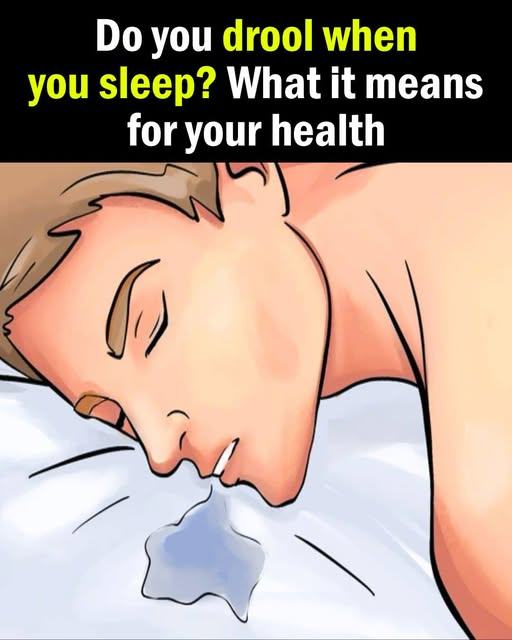Waking up to a damp pillow isn’t exactly the most glamorous way to start your day, but sleep drooling is more common than you might think. While it might seem harmless or even a little funny, chronic drooling during sleep can sometimes point to underlying health conditions that shouldn’t be ignored. From nasal congestion to neurological disorders, the reasons you might be drooling at night range from the simple to the serious. This article dives deep into ten common reasons you might be drooling while you sleep and what each of them could mean for your overall health.

1. Sleeping Position Matters More Than You Think
One of the most straightforward causes of drooling during sleep is your sleeping position. When you sleep on your stomach or side, gravity naturally encourages saliva to escape from your mouth. People who sleep with their mouths open are especially prone to this. While this isn’t usually a cause for concern, chronic mouth breathing can lead to dry mouth, bad breath, and even dental issues if left unchecked.
2. Blocked Nasal Passages
If you’re dealing with a stuffy nose from allergies, a cold, or sinusitis, you’re likely breathing through your mouth during sleep. Mouth breathing increases the likelihood of drooling because your mouth remains open throughout the night. Chronic nasal congestion might require medical attention or lifestyle changes, such as using a humidifier, avoiding allergens, or even getting evaluated for a deviated septum.
3. Sleep Apnea and Other Sleep Disorders
Obstructive sleep apnea is a potentially serious condition where your breathing repeatedly stops and starts during sleep. It often results in mouth breathing and drooling. People with sleep apnea may also snore loudly and feel excessively tired during the day. If drooling is accompanied by these symptoms, it could be a red flag that warrants a sleep study and proper diagnosis.
4. GERD (Gastroesophageal Reflux Disease)
GERD causes stomach acid to travel back up into the esophagus, sometimes reaching the throat. This reflux can trigger a response in your salivary glands, prompting them to produce more saliva in an effort to neutralize the acid. This excess saliva can then accumulate and escape during sleep, leading to drooling. GERD symptoms often include heartburn, chest pain, and a sour taste in the mouth.
5. Side Effect of Medications
Certain medications can increase saliva production or reduce your ability to swallow effectively, both of which can lead to nighttime drooling. Common culprits include antipsychotics, Alzheimer’s medications, and some tranquilizers. If you notice drooling after starting a new medication, talk to your doctor about adjusting your dosage or exploring alternative options.
6. Neurological Conditions
In more serious cases, excessive drooling can be linked to neurological disorders such as Parkinson’s disease, cerebral palsy, or the aftermath of a stroke. These conditions can impair muscle control in the face and mouth, making it difficult to manage saliva. If drooling is paired with other neurological symptoms like tremors, slurred speech, or difficulty swallowing, medical evaluation is crucial.
7. Tonsillitis or Throat Infections
Infections of the throat, tonsils, or adenoids can make swallowing painful or difficult, leading to drooling, especially at night. When your body avoids swallowing to minimize pain, saliva builds up and escapes from your mouth. These infections may also cause fever, bad breath, or difficulty breathing and should be treated promptly to avoid complications.
8. Enlarged Tonsils or Adenoids
Even without an active infection, anatomically enlarged tonsils or adenoids can block the airways and force mouth breathing, which promotes drooling. This is particularly common in children, but adults can experience it too. In some cases, surgical removal may be recommended to improve breathing and reduce drooling.
9. Bruxism (Teeth Grinding)
Bruxism, or nighttime teeth grinding, often occurs alongside jaw tension and mouth movement. These involuntary movements can lead to increased saliva production and nighttime drooling. Left untreated, bruxism can cause tooth damage, headaches, and jaw disorders. A dentist may recommend a night guard or further treatment to protect your teeth and improve sleep quality.
10. Poor Swallowing Reflex (Dysphagia)
Swallowing might seem like an automatic function, but it’s a complex process that can be disrupted by a number of conditions. Dysphagia, or difficulty swallowing, may result in saliva pooling in the mouth and eventually leaking out during sleep. Causes of dysphagia include stroke, multiple sclerosis, and muscular dystrophy. If you’re noticing frequent choking, coughing while eating, or unexplained weight loss, consult a healthcare provider immediately.
What You Can Do About Sleep Drooling
If drooling is affecting your sleep quality or causing embarrassment, there are several steps you can take:
- Change Your Sleep Position: Try sleeping on your back to reduce the effects of gravity on saliva.
- Treat Nasal Congestion: Use saline sprays, antihistamines, or consult an ENT specialist.
- Manage GERD: Avoid eating before bed, elevate your head, and take antacids if recommended.
- Evaluate Medications: Review side effects with your doctor and consider alternatives.
- See a Specialist: If you suspect a neurological cause, consult a neurologist or sleep specialist.
- Try Oral Appliances: Mouth guards can help with bruxism and promote better oral control.
When to See a Doctor
Occasional drooling isn’t typically a problem, but persistent or excessive drooling accompanied by other symptoms could indicate a more serious issue. Consult a healthcare professional if you experience:
- Ongoing fatigue despite adequate sleep
- Difficulty swallowing or speaking
- Unexplained weight loss
- Signs of infection or sleep apnea
Final Thoughts
Drooling while you sleep might feel like a minor nuisance, but it can also serve as a valuable clue to your overall health. Whether it’s the result of sleeping position or an underlying medical condition, understanding the root cause is the first step toward effective treatment. By paying closer attention to your body’s signals and seeking professional help when needed, you can improve not only your sleep quality but also your long-term well-being. What starts as a wet pillow could be the key to uncovering something deeper—and entirely treatable.

